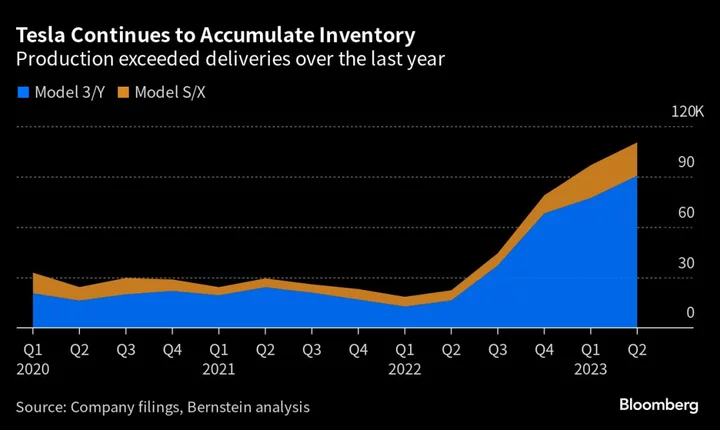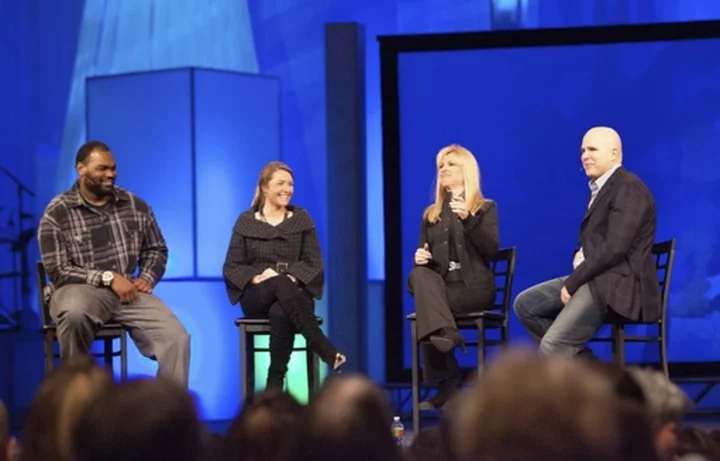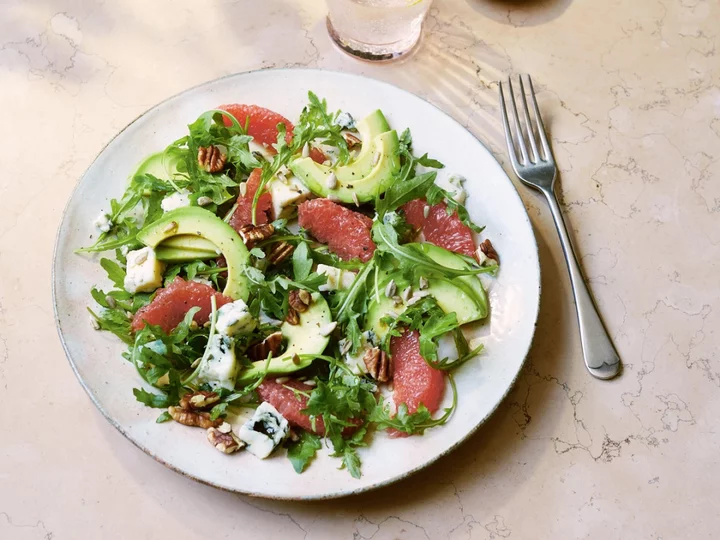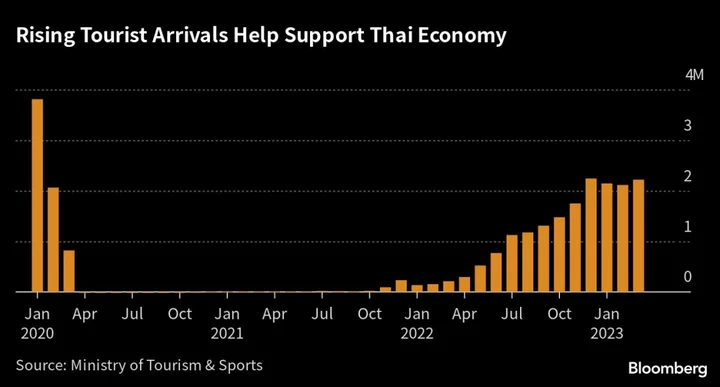
These Sennheiser earbuds are over $150 off, the lowest price we've ever seen
Save 53%: As of Sept. 28, the Sennheiser Momentum True Wireless 2 earbuds are marked
2023-09-28 23:57

Russian anti-war activist says he was banned entry into Serbia at Belgrade airport
A Russian pro-democracy activist residing in Serbia and a fierce critic of the invasion of Ukraine says Serbian authorities have banned him from entering the country upon return from a trip abroad
2023-07-13 16:27

This 8-piece Japanese Master Chef knife set is $140
TL;DR: As of August 23, you can get the Seido Japanese Master Chef's Eight-Piece Knife
2023-08-23 17:26

Travelers In Limbo After India Halts Visas in Canada in Escalating Dispute
Canadian tourists, business travelers and even some former Indian citizens are rushing to change flights and inquire about
2023-09-22 08:55

Tesla Tests the Limits of Elon Musk’s Minimal Model Strategy
There was a lot to like in Tesla Inc.’s latest quarterly numbers. The carmaker delivered roughly 18,000 more
2023-07-05 17:49

YouTuber agrees to plead guilty to federal charge after intentionally crashing his plane for online views, DOJ says
A 29-year-old YouTuber will plead guilty to a federal charge after he destroyed the wreckage of a plane he purposefully crashed to gain views, Justice Department officials announced Thursday.
2023-05-12 19:46

An oceanside Florida highway may be named after the late Jimmy Buffett
Soon, you may be able to cruise down a Florida highway named after singer Jimmy Buffett while listening to his A1A album named after the road.
2023-10-04 08:48

The Tucky Belt on 'Shark Tank': How and where to buy $30 DIY hack for unlimited crop tops?
Discover the Tucky Belt, Brooke Knaus' ingenious $30 DIY hack for limitless crop top styling, as seen on 'Shark Tank'
2023-05-20 06:58

Beyonce kicks of Renaissance tour in string of glamorous outfits
Beyonce has kicked off her Renaissance World Tour in Stockholm, Sweden, in suitable style. This is the Texan singer’s first world tour in seven years, and she performed the 36-song set list in at least nine different outfits. Styled by regular collaborator Shiona Turini, a stylist and costume designer, the glittering array of custom looks called upon high fashion designers from all over the world. Beyonce, 41, kicked off the show in a heritage British brand Alexander McQueen, designed by Sarah Burton. The heavily beaded and crystal-bejewelled bodysuit featured ‘anatomical embroidery’, according to the brand, had geometric accents on the hips and was inspired by outfits from the label’s autumn/winter 2023 collection. Another look was a sparkly catsuit that had a slightly surreal edge with hands creeping over the design. This was a custom outfit by Loewe, which is helmed by Northern Irish fashion designer Jonathan Anderson. Loewe has been responsible for some major pop culture moments this year – most memorably dressing Rihanna in all red for the Super Bowl half-time show. Beyonce has been a longtime fan of French fashion house Mugler – famously wearing a structured gold bodysuit from the label in the 2008 music video for Sweet Dreams. She once again turned to the brand for her onstage fashion, wearing at least two Mugler looks in Stockholm. One outfit seemed to be inspired by the brand’s iconic spring/summer 1997 couture collection, which was based around insects. Beyonce’s outfit was black and yellow and had an insect-style headpiece, emulating a bee – perhaps a nod to the name of her fandom, the Beyhive. In theme with the disco fashion of the night – to match the 70s-inspired sound of the Renaissance album – Beyonce also wore a silver bodysuit from French brand Courreges. Other outfits included a black look heavily embroidered in pearls, designed by Balmain’s creative director Olivier Rousteing – with whom Beyonce created a collaboration fashion collection in March – a silver caped outfit by cult designer Coperni, and an iridescent look by London-based designer David Koma. The tour is set to include several UK dates, including London’s Tottenham Hotspur stadium, Cardiff’s Principality Stadium, Murrayfield in Edinburgh and Sunderland’s Stadium of Light. According to Forbes, the Renaissance tour could gross between up to 2.4 billion dollars (£1.9 billion) from tickets alone by the time it ends in September. Beyonce released her seventh studio album, Renaissance, last year, with the sound inspired by house music and dancefloor-focused Afrobeats. It was met with wide acclaim, and in February she became the most decorated Grammy artist of all time after collecting her 32nd trophy at the 65th annual ceremony. Read More Charity boss speaks out over ‘traumatic’ encounter with royal aide Ukraine war’s heaviest fight rages in east - follow live Pensioner, 85, shares the simple switch that’s helped him to do 650,000 press-ups 10 clever ways to style up your home office 5 sunglasses trends that will be everywhere this summer
2023-05-11 18:55

Philadelphia Cream Cheese Debuts Plant-Based Spread Nationwide
PITTSBURGH & CHICAGO--(BUSINESS WIRE)--Jul 25, 2023--
2023-07-25 20:22

This TikTok Runner Went Viral For Finding Shorts That Don’t Ride Up
Part of TikTok’s compulsively watchable appeal is the FYP’s ability to show you new things that also feel like exactly what you were looking for — you just didn’t know it yet. Like when I stumbled on a viral video from a runner who had found the impossible: running shorts that don’t ride up. When Erin Azar — also known as Mrs. Space Cadet, the “professional struggle runner” — appeared on my TikTok feed, I felt like the algo hit hard. As a person who is often unmotivated to finish any sort of creative or personal task, the literal push I was seeing from Azar and her runs really got me emotional and inspired (Azar is also hilarious, so there’s lots of giggling, too). She also often reviews running gear, including the elusive shorts that won’t ride up.
2023-06-29 01:15

Tuohys' lawyers to respond to Michael Oher's accusations as he fights conservatorship
Lawyers for Sean and Leigh Anne Tuohy plan to speak with reporters about former NFL player Michael Oher's petition to end the couple's conservatorship over his finances in a now-public dispute involving those who inspired the movie “The Blind Side.”
2023-08-17 02:45
You Might Like...

Simple summer salads: Roquefort, rocket and pink grapefruit

The Best Black Friday Deals on Gaming PCs and Laptops Under $1,000 Are Running Out Fast

Saks Has A Stash Of Designer Clothes & Handbags That Are Up To 70% Off

All the ways the 'Barbie' promotional tour is giving us life

Tourism to Limit Thai Economic Pain as New Government Awaited

How to block a number on iPhone

New Twitter CEO is former NBCUniversal exec Linda Yaccarino

Model Emily Ratajkowski unveils latest fashion campaign
